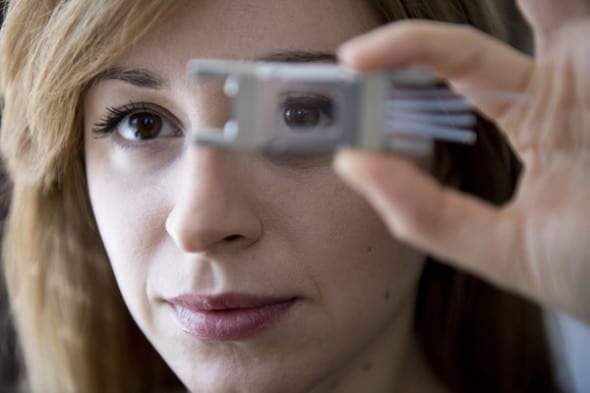
Software can remotely control ScanDrop’s activity from anywhere on the planet
A few hundred dollars and 24 hours: That’s what’s required to scan biological materials for important biomarkers that signal diseases such as diabetes or cancer, using industry standard equipment. But suppose you wanted to monitor live cancer cells. For that you’d have to use an entirely different method. It takes just as long but requires a whole other set of expensive top-??end instrumentation. Want to look at bacteria instead? Be prepared to wait a few days for it to grow before you can get a meaningful result.
Researchers face enormous time constraints and financial hurdles from having to run these analyses on a regular basis. To solve this problem, Tania Konry, an assistant professor of pharmaceutical sciences at Northeastern University, has developed a single instrument that can do all of the scans mentioned above at a fraction of the time and cost. That’s because it uses considerably less material and ultra-??sensitive detection methods to do the same thing.
Konry’s creation, ScanDrop, is a portable instrument no bigger than a shoebox that has the capacity to detect a variety of biological specimen. For that reason it will benefit a wide range of users beyond the medical community, including environmental monitoring and basic scientific research.
The instrument acts as a miniature science lab, of sorts. It contains a tiny chip, made of polymer or glass, that is connected to equally tiny tubes. An extremely small-??volume liquid sample—whether it’s water or a biological fluid such as serum—flows in one of those tubes, through the lab-??on-??a-??chip device, and out the other side. While inside, the sample is exposed to a slug of microscopic beads functionalized to react with the lab test’s search parameters. For example, one type of bead could be covered with antibodies that selectively bind to e. coli to test water quality. Other types could detect cancer biomarkers or bind to the tetanus virus to test for immunity.
“It can be any biological agent,” Konry said. “We take the same approach.”
The beads fluoresce when the specific marker or cell in question has been detected; from there, an analysis by ScanDrop can provide the concentration levels of that marker or cell.
Because the volumes being tested with ScanDrop are so small, the testing time dwindles to just minutes. This means you could get near-??real time measures of a changing sample—be it bacteria levels in a flowing body of water or dynamic insulin levels in the bloodstream of a person with diabetes.
Konry noted that not only are other testing mechanisms prohibitively expensive, but they are also fairly useless in the field—particularly in remote areas—because the instruments are large and require long times for analysis. By comparison, ScanDrop’s portability makes it much more functional and efficient in the field.
Her team recently joined forces with a group at the Lawrence Berkeley National Lab, which developed software that can remotely control ScanDrop’s activity from anywhere on the planet. This functionality could be particularly useful when the instrument is set up in the field to continuously monitor the environment.
The Latest on: Portable miniature science lab
[google_news title=”” keyword=”Portable miniature science lab” num_posts=”10″ blurb_length=”0″ show_thumb=”left”]
via Google News
The Latest on: Portable miniature science lab
- An affordable miniature car-like robot to test control and estimation algorithmson April 29, 2024 at 10:50 am
The development and testing of algorithms for robotics applications typically requires evaluations in both simulated and physical environments. Some algorithms, however, can be difficult to deploy in ...
- Arzopa Z1RC review: It’s not all hypeon April 28, 2024 at 9:06 am
The Arzopa Z1RC is an excellent portable monitor, especially at this price point. The display tech isn’t as advanced as some other options, but it’s slim for good portability, has a good build, and is ...
- Novel lab-grown mini-colons can accurately mimic the development of colorectal tumorson April 25, 2024 at 12:25 pm
In a breakthrough for cancer research, scientists at EPFL have created lab-grown mini-colons that can accurately mimic the development of colorectal tumors, offering a powerful new tool for studying ...
- Scientists just grew super realistic, miniature colons in the lab and gave them canceron April 24, 2024 at 8:00 am
The tiny colons were grown from mouse stem cells, but human versions could one day be used to test new drugs for colorectal cancer, scientists say.
- Ultimate Mother’s Day Gift Guide: 30+ Easy Ideas for New Moms and the Woman Who Has Everything (Plus Discount Codes!)on April 23, 2024 at 5:24 am
Promising Review: "I love this necklace! I bought it as a gift for myself for my first Mother’s Day and to celebrate all I’d done through the pregnancy and birthing to bring my baby boy into the world ...
- Allergy season has arrived and air purifiers are on sale at Amazonon April 22, 2024 at 11:13 am
Is anyone else having a really bad time this allergy season? I don’t know about you, but it seems like my daily Zyrtec is hardly putting a dent in the deluge of tree pollen that’s descended this ...
- Miniature sensors, offer rapid on-site measurement of traces of ‘forever chemicals’, at values below European Union thresholdon April 22, 2024 at 7:27 am
Grapheal, a deep-tech startup developing specialised biosensors, and the EDYTEM laboratory, a joint research unit between France’s Center for Scientific Research (CNRS) and Savoie Mont Blanc ...
- Beta's 'Charge Cube' Earns UL Safety Certificationon April 19, 2024 at 9:00 am
Beta Technologies has received UL safety certification for its "charge cube," a fast charger for electric aircraft, cars, and trucks.
- Scientists trigger mini-earthquakes in the labon April 19, 2024 at 8:28 am
Earthquakes and landslides are famously difficult to predict and prepare for. By studying a miniature version of the ground in the lab, scientists at the UvA Institute of Physics have demonstrated how ...
- Grapheal and EDYTEM laboratory fine-tune portable sensor for detecting water-borne PFASon April 17, 2024 at 12:43 am
Miniature sensors, developed by ‘Fluorograph’ joint laboratory, offer rapid on-site measurement of traces of ‘forever chemicals’, at values below Eur ...
via Bing News









